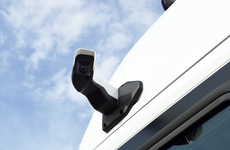
Toyota Safety Sense Introduces Vehicle-to-Vehicle Communication
Meghan Young — February 11, 2015 — Autos
References: toyota & leftlanenews
The car industry is beginning to implement vehicle-to-vehicle communication to increase safety on the road and Toyota Safety Sense is one of the first systems to be put into place this year. Through this system, Toyota drivers will receive both visual and audio warnings when approaching vehicles pose a potential threat.
Although Toyota Safety Sense is dependent on other vehicles being outfitted with Integrated Traffic System (ITS) wireless frequency, the future is promising since "the National Highway Traffic Safety Administration plans to mandate integration of V2V tech in future vehicles," reports Left Lane News. With technology like Toyota Safety Sense, the agency believes 600,000 crashes and 1,000 deaths can be prevented annually.
Until then, Toyota Safety Sense will continue to improve with upgrades offered by 2017.
Although Toyota Safety Sense is dependent on other vehicles being outfitted with Integrated Traffic System (ITS) wireless frequency, the future is promising since "the National Highway Traffic Safety Administration plans to mandate integration of V2V tech in future vehicles," reports Left Lane News. With technology like Toyota Safety Sense, the agency believes 600,000 crashes and 1,000 deaths can be prevented annually.
Until then, Toyota Safety Sense will continue to improve with upgrades offered by 2017.
Trend Themes
1. Vehicle-to-vehicle Communication - As more car companies begin to implement vehicle-to-vehicle communication, there are opportunities to create new technologies that enhance this communication and increase road safety
2. Smart Auto Warning Systems - The introduction of smart auto warning systems that utilize V2V communication opens up an opportunity to create new safety technologies that will provide drivers with more advanced warnings, potentially reducing accidents and saving lives
3. Integrated Traffic System - As the National Highway Traffic Safety Administration plans to mandate integration of V2V tech in future vehicles, there will be opportunities for companies to create new technologies that integrate seamlessly with this system and help improve road safety
Industry Implications
1. Automotive Industry - The automotive industry will need to continue developing and integrating V2V communication and smart warning technologies to provide drivers with the safest ride possible
2. Technology Industry - As more companies begin to implement V2V communication, there will be opportunities for technology companies to develop new products that enhance these systems and make them more effective
3. Safety and Security Industry - V2V communication and smart warning systems are critical tools for the safety and security industry, offering a new market for businesses to grow with advanced safety features
2.4
Score
Popularity
Activity
Freshness























